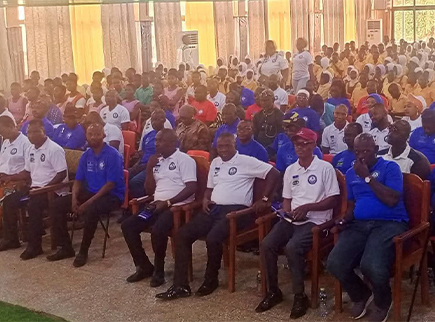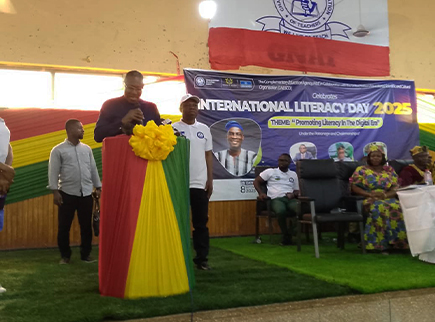Dr. Clement Apaak, Deputy Minister for Education, has reaffirmed the government’s commitment to strengthening complementary education and reducing illiteracy as Ghana joined the global community to mark the 58th International Literacy Day in Tamale.
He said literacy remained the bedrock of national development and must be pursued with urgency in the digital era.
Dr. Apaak made the remarks at a ceremony attended by stakeholders from government agencies, civil society, traditional and religious authorities, and students. The event was organised by the Complementary Education Agency (CEA) under the theme “Promoting Literacy in the Digital Era” with support from UNESCO, the National Lottery Authority, and Bulk Oil Storage and Transportation Limited.
Citing the 2021 Population and Housing Census, he said Ghana’s literacy rate stood at 69.8 per cent, leaving an illiteracy rate of 30.2 per cent, which he described as a major concern. “Illiteracy has crowded out many citizens from exploring opportunities within the digital economy. No nation can ignore education and consider development without it,” he stressed.

The Deputy Minister outlined government interventions such as the Complementary Basic Education (CBE), Communities of Excellence Programme, and the National Standardised Test to address learning poverty and expand opportunities for out-of-school children.
He acknowledged the vital role of the CEA in transforming the literacy landscape but admitted that it faced severe staffing and resource gaps. While the agency required 6,000 staff nationwide, it was operating with just over 1,700. He assured that government was working to regularise the agency’s Legislative Instrument and integrate staff into the public service to improve its operations.
Dr. Apaak emphasised the need for stronger collaboration with non-state actors, describing literacy as a powerful tool to fight poverty, advance human progress, and unlock opportunities in the digital age.
Mr. Salahudeen Abukari, Acting Northern Regional Director of the CEA, said the agency continued to broaden its reach through functional literacy classes, skills development programmes, and reintegration initiatives. In the Northern Region alone, 51 functional literacy classes with 1,158 learners and 41 occupational skills classes with 869 learners were operational.
He added that 110 additional classes across Yendi, Zabzugu, and Tatale had enrolled 2,750 learners. In 2024, 200 Junior High School dropouts completed seven months of remedial studies and progressed to Senior High Schools, while 730 SHS dropouts received remedial education, though only 31 managed to sit for the WASSCE due to financial challenges.
Mr. Abukari praised facilitators, learners, and stakeholders for their dedication, noting that the CEA had evolved from its origins as the Non-Formal Education Division to a key agency supporting complementary basic education, remedial programmes, and occupational skills training.

